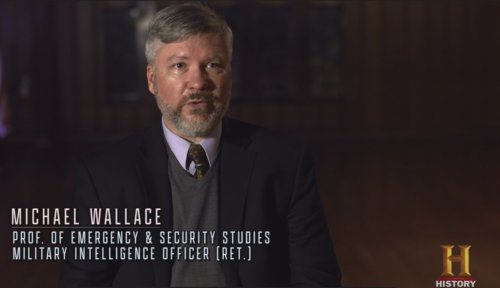
Emergency Management Pros Needed for Pending Threats to U.S. Power Grids

As Dr. Mike Wallace, director of Tulane School of Professional Advancement’s Emergency and Security Studies program, shares in his recent appearance on Doomsday Scenarios from America's Book of Secrets on The History Channel, “When you take power away...society will break down pretty quickly.”
Recent threats to the electrical grid have been localized and temporary, but as Dr. Wallace points out, prolonged lack of electricity can lead to a breakdown of society as we know it. Dr. Wallace heads a program at Tulane University's School of Professional advancement, which offers several emergency services higher education options, including more than one online emergency management degree. Many of the faculty who work with Dr. Wallace at SoPA come from professional careers in public safety, public health, and the military.
Due in part to distributed authority and varying degrees of regulation, the United States is likely more susceptible to threats on its various power grids than other nations.
Hear more from Dr. Wallace on New Orleans Fox 8
Learn more about Tulane SoPA's full range of programs in Emergency and Security Studies.
Historical Threats and Real-world Disasters
While actual "attacks" are infrequent, natural disasters are demonstrating the need for disaster preparedness in response to power grid threats.
Cybersecurity experts warn that terrorism and state-sponsored resources are likely to continue to target the power grid.
In an April 2020 article on Power Technology, the author highlights five of the worst cyberattacks in recent history. According to the author, between 2010 and 2014, the U.S. Department of Energy reported 150 successful attacks on systems holding information on the electricity grids.
Direct physical attacks sometimes make it necessary to focus the disaster response in the real world, as in the multiple attacks on the Arkansas Power grid detailed in the 2014 NY Times article.

Power Grids Are at Risk from Natural Disasters
Many newsworthy natural hazards have had disaster management professionals rethinking their emergency response measures.
Frozen power lines in Texas, hurricanes on the Gulf Coast, and earthquakes out West all exemplify the need for homeland security and FEMA to consider risks to the power grid in their emergency management programs.
Two recent examples, Hurricane Ida and the Texas ERCOT power grid failure, highlight the human cost of power systems failures. While both of these were temporary, one can see how as Dr. Wallace suggests, continued outages would ultimately pose a risk to civil society.
Power Grids Are Susceptible to Terrorist Attack
As the Greater New Orleans area recently learned, any emergency preparedness plans will be in vain in the face of catastrophic failure. Law enforcement and emergency medical services were stymied by the failure of all power systems.
When so many grids are susceptible to single points of failure, physical acts of terrorism can be devastating, as we see in the Arkansas example.
And, of course, as we see in the Power Technology article cited above, private and, allegedly, state-sponsored hackers are responsible for all manner of power grid mayhem.
Power Grids at Risk from Inefficient Management and Mismanagement
Many would suggest that the Texas example is more a story of poor management than of unpreparedness for weather emergencies. Without a clear public policy directive for all electrical grid providers, there is not necessarily an incentive to maintain the level of redundancy and failsafe mechanisms needed to mitigate all of the potential threats to the power grid.
According to The Texas Tribune:
But policy observers blamed the power system failure on the legislators and state agencies, who they say did not properly heed the warnings of previous storms or account for more extreme weather events warned of by climate scientists. Instead, Texas prioritized the free market.

The Role of Emergency Management Directors
According to the Bureau of Labor Statistics (BLS), emergency management directors prepare plans and procedures for responding to disasters and emergencies.
They may also help lead the response when disaster strikes.
Typically an emergency management director will work for local or state government and sometimes in larger public and private employers such as hospitals and universities.
With threats to the power grid and other critical infrastructure from nature and enemies foreign and domestic, the job outlook for emergency management graduates is very good.
Learn more about Tulane SoPA Emergency and Security studies.
How Long Does It Take to Get an Emergency Management Degree?
There are many types of degree programs available to enter the field of Emergency Management.
Undergraduates can earn a traditional or online undergraduate degree. Returning students may earn a master's degree, a bachelor of science, or certificates in specific fields.
Any of these emergency management degree programs can be helpful if one is hoping to be part of the solution when the electrical grid is threatened or other natural or manmade disasters loom.
Online programs, and those which offer a hybrid bachelor's degree program, make it easier for working students and veterans to find a role in public service and take part in the hazard mitigation when our critical infrastructure is threatened.

Do You Need A Degree to Work in Emergency Management?
Though the BLS suggests one needs a bachelor's degree and significant work experience, there are many roles in emergency management that do not require you to obtain a full emergency management degree online. If one is able to take the time for an online bachelor's degree, they'll likely see quicker progression in the field of emergency management.
It is easier than ever to enter and pay for an online degree program. In most cases, financial aid is available, and it's possible to reduce the cost of tuition and fees with credit for life experience.
Students applying to the MPS in Emergency Management program at Tulane SoPA may also apply for transfer credits.
Wherever you study, be sure to validate their accreditation as not all online degree programs are created equal.
Be the Next Line of Defense Against U.S. Threats
Whether with certificates, a B.S., a B.A., or an MPS, Tulane SoPA can assure you're able to obtain an emergency management degree online, in person, or in a hybrid online, on-campus format. With a high school diploma and a good work ethic, you can get started on the road to a career keeping the rest of us safe from threats.
With course topics available, including homeland security, emergency management, intelligence, and even a graduate certificate in sport security, you're sure to find a path that suits you.
Learn more about Tulane SoPA's full range of programs in Emergency and Security Studies.
Resources:
NY Times: Power Grid Is Attacked in Arkansas
Power Technology: The five worst cyberattacks against the power industry since 2014
Tulane SoPA: History Channel taps SoPA professor for expertise on doomsday scenarios
History Channel: America's Book of Secrets S4 E7 Doomsday Scenarios
Fema: Emergency Management Training
US Bureau of Labor Statistics: Emergency Management Directors
Explore Our Most Recent Applied Computing Systems & Technology News & Blog Posts
Take the Next Step.
By submitting this form, you agree to receive information about the Tulane School of Professional Advancement’s programs via email, phone and/or text. You may opt out at any time.




